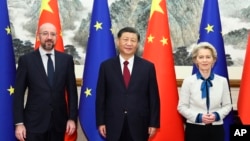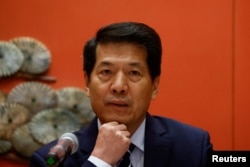China has launched a new push to repair relations with the EU in recent weeks, deploying its special envoy on Eurasian affairs on a “shuttle diplomacy” tour through several European countries while calling on Brussels to prioritize the common interests rather than differences between the two sides.
At a press conference during China’s annual parliamentary meeting last week, Chinese Foreign Minister Wang Yi pushed back against the European Union’s characterization of China as “a partner, competitor and systemic rival” while reiterating that their common interests “outweigh” differences.
“China and Europe do not have clashing fundamental interests between them, or geopolitical and strategic conflicts,” he said in front of dozens of local and foreign journalists. “The two sides should be characterized rightly as partners, [and] cooperation should be the defining feature of the relationship.”
Some analysts say Wang’s emphasis on “common interests over differences” reflects Beijing’s attempt to use mild diplomacy in a bid to improve relations with Europe.
“Over the last few months, China has been trying to stabilize not only their relationship with the U.S. but also their relations with the EU,” said Justyna Szczudlik, a China analyst and deputy head of research at the Polish Institute of International Affairs.
In light of Brussels’ toughening stance on China, including sanctions imposed on Chinese companies supporting Russia, Szczudlik told VOA in a phone interview that Beijing is aware that the EU has leverage on them.
“China also needs stability because of the economic headwinds and social problems they are facing,” she said.
Despite Beijing’s attempt to reduce tension with European countries through measures such as extending visa-free travel to six other European countries, some experts say the effect of this strategy will be limited.
“While European countries recognize that Beijing is trying to improve relations with the EU, all the old problems still prevail, including uneven trade disputes and China’s stance on the Ukraine war,” Sari Arho Havren, an associate fellow at the Royal United Services Institute in Brussels, told VOA by phone.
She said that while Brussels has repeatedly highlighted its trade pain points and other concerns during meetings with Beijing, those messages don’t seem to have registered with the Chinese side. “Nothing is happening [on the Chinese side], so I don’t think Beijing is listening to the EU’s concerns,” Havren said.
Since the beginning of March, Li Hui, the Chinese special envoy on Eurasian affairs, has been conducting “a second round of shuttle diplomacy” across Europe, traveling to Russia, Brussels, Poland, Ukraine, Germany and France.
During his meeting with top European diplomats in Brussels, Li expressed Beijing’s firm opposition to the EU’s inclusion of Chinese companies in its sanctions against Russia while urging the EU to “return to the right track of dialogue and consultation with China,” according to the official readout issued by the Chinese government.
Apart from urging Brussels to lift sanctions on the Chinese companies, the South China Morning Post reported, Li also told European officials that “no discussion on Ukraine’s territorial integrity would take place until the violence stops,” which he claimed could only happen if “the EU stops sending weapons to Ukraine.”
In response, the EU expressed concerns about the large volumes of dual-use and advanced technology items that China has exported to Russia’s military-industrial complex and said China’s position on the Ukraine war “inevitably impacts” the bilateral relations.
Brussels also urged Beijing to “play a constructive role” by calling on Russia to withdraw all forces “from the entire territory of Ukraine” within its internationally recognized borders.
Some experts say the EU’s readout shows they don’t expect Beijing to play a constructive role in facilitating a potential cease-fire and peace talks between Russia and Ukraine.
“The EU feels that Li was delivering messages close to Moscow’s propaganda during their meeting, and it would likely make Brussels less willing to open up to the olive branch from China,” Zsuzsa Anna Ferenczy, an expert on China-EU relations at the National Dong Hwa University in Taiwan, told VOA in a phone interview.
Ferenczy said that while China’s commitment to its partnership with Russia has damaged the EU’s trust in Beijing, Brussels has repeatedly expressed its commitment to “keep channels of communication open” with the Chinese.
Amid Beijing’s renewed diplomatic outreach, the EU has adopted a series of measures that some analysts say signal a toughening stance on its trade relations with China. Last week, the European Commission started customs registration of electric vehicles imported from China, paving the way for a possible imposition of tariffs on Chinese EVs.
Additionally, the EU is moving closer to adopting an anti-forced-labor law, which could ban imports from China’s Xinjiang region, where some research and media reports suggest a large number of Uyghur Muslims are being subjected to forced labor, an accusation Beijing denies.
Szczudlik in Poland said the potential adoption of these trade measures shows that the EU’s handling of its trade relationship with China has gone from “setting up defensive tools” to “being offensive.”
“This process is a good example that the EU is not toothless when it comes to China,” she said.
The EU is preparing to hold its parliamentary election in June, and European Commission President Ursula von der Leyen is running for reelection in 2024, but Ferenczy in Taiwan said she doesn’t expect any big changes in EU-China relations in the short term.
“I expect the European side to remain skeptical of China and push forward the same agenda,” she said, adding that the outcome of the two elections may have some impact on how the EU shapes its policies toward Beijing.






